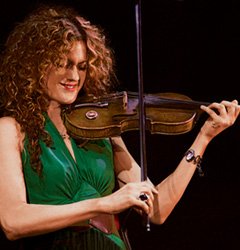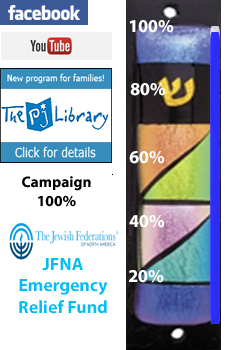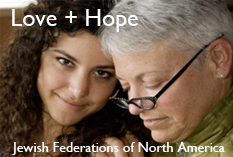
I stood in front of a crowd in a darkened theater. It felt strange not to have a violin in my hands, but I wasn’t in New York City for a concert. Instead, my audience was a group of journalists and photographers. They knew me as the “hip-hop violinist,” but to me, this event on May 2, 2008, Holocaust Remembrance Day, Yom Hashoah, felt more important than any show. I turned to the projection screen, where a documentary featuring teens from across America played. “What’s the Holocaust?” the interviewer asked. One kid gave a blank stare. “Wasn’t that something in World War I?” Another teen said, “That’s a Jewish thing; it has nothing to do with me.” I couldn’t blame him for thinking that. I used to believe that too, and I am Jewish. I grew up in Ra’anana, north of Tel Aviv, Israel. Even so, the Holocaust wasn’t something I gave a lot of thought to as a young girl. My school went to the Yad Vashem Holocaust museum on a field trip; we read about Hitler and the concentration camps in our textbooks. But I didn’t see how the Holocaust had any relevance in my life. It was ancient history, a sad story no one liked to talk about. The world had moved on.
Then, when I was 12 years old, I was given a school assignment to create a family tree. I had to trace my family as far back as I could. “Ask your savta and saba,” my dad suggested—my grandparents. I went to their house armed with a notebook full of names I had collected and lines linking them to one another. “What is this for?” my grandmother asked, sitting on the couch next to my grandfather.
“I need to know our family history,” I said. “Tell me about our family in Poland.”
My grandparents were silent for the longest time. Then my grandmother’s eyes began to water. I had never seen her cry. She was always so strong. Now tears crept down her face, and she gripped my grandfather’s hand. “I’m sorry,” she said. “We haven’t thought about those things in a long while.”
“Haven’t thought about what?” I asked.
“The Holocaust,” she whispered.
They grew up in separate towns in Poland. The Nazis invaded both, going from house to house, rounding up the Jews, not caring if they were religious or if they just had a Jewish family member. They took them all. And then they killed the Jews, either in the street, or later, in concentration camps. “There was a little girl about your age who played the violin like you,” my grandmother recalled. “The Nazi soldiers heard her playing, and dragged her out of her home. They made sure she could never play again.”
My grandfather shut his eyes. “We were some of the only ones in our families to survive,” he said quietly.
Why didn’t I know? Neither my grandparents nor my parents had ever talked about it. Suddenly, the Holocaust was personal. Something that had happened to my family. It had happened to a little girl with a violin. A girl like me. Every time I play, I vowed, I will play for her.
At 19 I moved to New York to pursue music, and fell in love with the jazz scene, playing open mikes and charming my way into jam sessions, hoping to be discovered. One evening, Wyclef Jean of the legendary Fugees saw me perform. Later, he featured me at Carnegie Hall.
My big break came at the Apollo Theater, when I brought down the house, fiddling over hip-hop beats on national TV. The hip-hop community embraced me. The more I hung with the artists, the more I learned about their music. Musicians like the Fugees saw songs as a way to tell a story—their story, about being black in America, from slavery to Martin Luther King, Jr., to the present.
The struggles they had reminded me of the struggles of the Jewish people. “How can you talk about such terrible times?” I asked Wyclef.
“It’s important for kids to know about history,” he said. “By understanding what our people went through in the past, they can help build the future. Remembering makes us strong enough to prevent it from happening again. We have to talk about it. To everyone.”
Maybe I could do the same.
My manager arranged a dinner with Jane Oster and her mother, Ann, one of the founders of the Museum of Jewish Heritage in New York. Jane, too, was the granddaughter of Holocaust survivors. I told her about wanting to speak about my Jewish heritage, about what had happened to all those lost grandparents, aunts, uncles, cousins—a generation of families. “I don’t think enough people know about the Holocaust,” I said.
“The problem is worse than you think,” Jane said. A Jewish organization had conducted a poll of American teens. Fifty percent couldn’t say what the Holocaust was. And the majority didn’t find it relevant to their lives today.
That night we formed a group called Gedenk, “remember” in Yiddish. We brainstormed ways to get our message out. What had gotten the message across to me? I thought of my grandparents, how their lives had been changed in an instant. How I saw myself in that young violinist in Poland.
Now the light from the projector fluttered. The documentary produced by the organization that conducted the poll of American teens faded to black. I focused on the screen as the public-service announcements we’d filmed faded in. A New York subway car, filled with passengers. The doors open and soldiers rush in, shouting, attack dogs snarling. Then a flash—and we see a black-and-white photo of the trains that led to the concentration camps. In the next scene, a family spending time together in a suburban home is overrun by secret police and pulled outside to an uncertain fate. In the last, I shared the story my grandparents had told to me. The message was simple. “The Holocaust happened to people like us,” I narrated. “We must never forget.”
It started in a theater, but our campaign would soon be on MTV, VH1, places to reach young people who need to know about the Holocaust. God gave us the ability to remember so that we wouldn’t repeat past mistakes, so that we would grow stronger from our experiences, no matter how horrific they may have been, so that we can build a brighter future. I think of that as I perform. My bow glides across the strings and the sweet, deep notes sound out. Notes a little girl from Poland once played. Notes I will never let hate silence again.
Photo caption: Michael Hoffmekler, conductor of the St. Ottilien Jewish Orchestra, around 1946. From the archives of Sonia P. Beker.
Guideposts Magazine 1
Web: http://www.guidepostsmag.com, Email: info@guidepostsmag.com















































